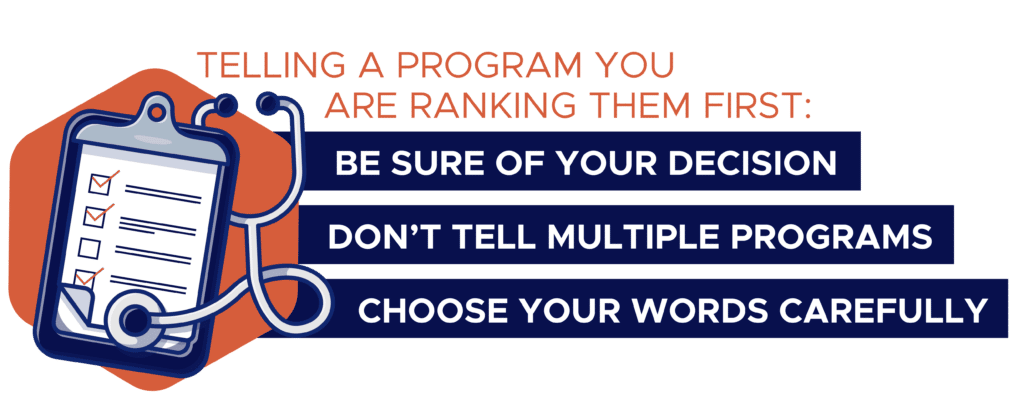You’re starting to complete some residency interviews. Congrats!
You’ve prepared for these interviews for months. From submitting your applications to each residency program to thoughtfully perfecting your answers to common questions, lots of time, effort and stress went into that moment (even to getting your zoom background perfected for the interview ha!).
Now that you have completed your interview, you want to look ahead to your next interviews and prepare for ranking. Here are some tips for what to do next.
How should I approach my next interview?
Once you have one or two under your belt, you will have a better understanding of what to expect in your next interviews. Reflect on your experience and use that to prepare. Here are questions you may want to consider:
- Did you feel adequately prepared for the questions that were asked? What common questions do you need to practice again and what new ones do you need to rehearse?
- Since interviews are virtual again this year, did your interview set up work? Adjust your space if needed to ensure a quiet area with adequate light and everything you need.
- Did your nerves affect your interview? If so, how can you prepare more or adjust your environment to calm your nerves?
- While in your interview, did you identify any new questions to ask each program? If so, jot them down on your cheat sheet for future interviews.
How should I communicate with a residency program after the interview?
Communicating with a residency program post-interview can be a gray area, but being aware of a program’s communication practices can make it a little simpler.
Should I send a thank you note to a residency program after an interview?
After an interview, you are likely grateful for the opportunity and want to communicate that to the interviewers, but you should know what the program asks for.
If a program explicitly says they don’t respond or asks that interviewees not contact the program, respect that. If a program doesn’t say whether they do or not, you can send one if you want, but it is not necessary.
“It almost never makes a difference [in the decision on an applicant] and I certainly don’t write it down if someone doesn’t send a thank-you note,” said Hilary Fairbrother, MD, vice chair of education in the emergency medicine department at the University of Texas at Houston says in an AMA article.
Even though some may say it won’t positively affect the program’s perception of you, we don’t think it is necessarily going to hurt you either. If you are going to follow up, be sure to do it within a couple days of your interview. Sending a thank you weeks later could be less beneficial as the program may have interviewed dozens of applicants since your interview.
Should I send a handwritten or digital thank you note?
In the past, residency candidates were encouraged to send handwritten thank yous, but now, emails are often preferred.
I didn’t receive a response from my residency interview thank you note. Should I be worried?
If you send a thank you note but don’t hear back, don’t worry! Some programs have a rule to not respond, but don’t communicate that to interviewees.
Should I tell a residency program I am ranking them first?
You leave an interview, and everything was fantastic! You love the program and want to share that with your top choice! There are mixed perspectives on if this strategy is helpful for matching with your desired program.
Many believe this can be beneficial to your ranking if done tactfully. But this is only recommended if you are sure your ranking order will not change.

The most important rule to know when sharing this is to be truthful. Here are ways to maintain your honesty:
- Be sure of your decision. It is best to communicate this to a program only if you are sure. If you tell a program that you will rank them number one, then change your mind and match somewhere else, it is not a good look.
- Don’t tell multiple programs. Honesty is important. It is important to realize that the medical community is fairly small and program directors talk to each other. It is likely that if you tell multiple programs you are ranking them #1, that will come back to bite you.
- Choose your words carefully. If you do decide to tell a program they are your top choice, you may want to make that clear. If you are not ranking them #1 but tell a program “you are among my favorites,” that may be taken as a back-handed compliment.
How should I prepare for ranking residency programs post-interview?
A recent study shows that the biggest predictor of happiness in a program is the residency fit or the alignment between the individual and program, with factors like call schedule and patient caseload. As you get closer to Match Day, it is easy to let prestige and other factors get in the way of your first impressions.
When balancing clinical rotations and preparing for residency, your interviews may run together and your judgment may be clouded by external factors by the time you rank. Immediately after your interview, it is important to record your initial thoughts to help guide you through the ranking process in a few months.
When I went through residency interviews, I recorded voice memos on my phone directly after the interview while my impression of the program was still fresh. If I had a hard time figuring out the rank order, I would listen to the recordings to see what my initial impression was of the program, and it was pretty clear which programs I was initially excited about or which ones I was less than excited about.
You can also download the National Resident Matching Program PRISM app. This free app streamlines this process by allowing you to track and rate programs throughout the residency interview process.
Looking ahead to ranking…
Ranking medical residency programs is an individual experience. Each residency applicant places different values on different aspects of each program. As you move through interviews and make your residency ranking list, it may be helpful to consider how much things like location, culture, work-life balance and faculty matter to you.
For more tips and resources to help you through the interview process, visit our Match Day page or check out some of our featured resources below:
- Match Day 2023: Residency Interview Tips
- Three Things I Learned From Match Day
- Residency Match Day 2023: What to Expect Before, During, and After
Panacea Financial, a division of Primis. Member FDIC.

